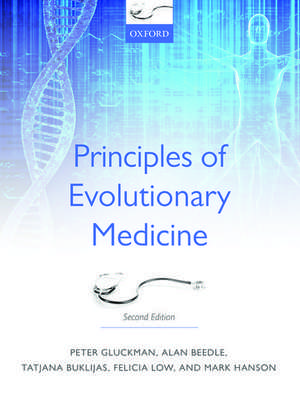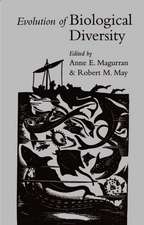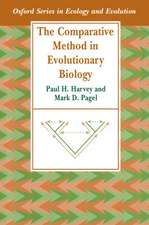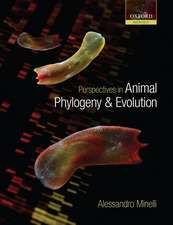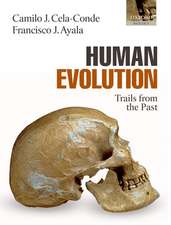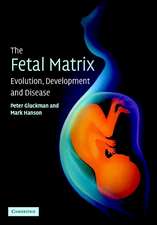Principles of Evolutionary Medicine
Autor Peter Gluckman, Alan Beedle, Tatjana Buklijas, Felicia Low, Mark Hansonen Limba Engleză Paperback – 17 mar 2016
| Toate formatele și edițiile | Preț | Express |
|---|---|---|
| Paperback (1) | 315.39 lei 10-16 zile | +121.47 lei 4-10 zile |
| OUP OXFORD – 17 mar 2016 | 315.39 lei 10-16 zile | +121.47 lei 4-10 zile |
| Hardback (1) | 679.26 lei 10-16 zile | |
| OUP OXFORD – 17 mar 2016 | 679.26 lei 10-16 zile |
Preț: 315.39 lei
Preț vechi: 398.64 lei
-21% Nou
Puncte Express: 473
Preț estimativ în valută:
60.36€ • 62.88$ • 50.18£
60.36€ • 62.88$ • 50.18£
Carte disponibilă
Livrare economică 09-15 ianuarie 25
Livrare express 03-09 ianuarie 25 pentru 131.46 lei
Preluare comenzi: 021 569.72.76
Specificații
ISBN-13: 9780199663934
ISBN-10: 0199663939
Pagini: 400
Dimensiuni: 190 x 245 x 20 mm
Greutate: 0.86 kg
Ediția:2
Editura: OUP OXFORD
Colecția OUP Oxford
Locul publicării:Oxford, United Kingdom
ISBN-10: 0199663939
Pagini: 400
Dimensiuni: 190 x 245 x 20 mm
Greutate: 0.86 kg
Ediția:2
Editura: OUP OXFORD
Colecția OUP Oxford
Locul publicării:Oxford, United Kingdom
Recenzii
This volume will appeal to a broad readership of students and faculty in a variety of disciplines ... I recommend this book highly as a clear and accessible introduction to the growing field of evolution, medicine, and public health.
Notă biografică
Professor Sir Peter Gluckman is a well-known biomedical scientist. Author of over 650 scientific papers and reviews, and of technical and popular science books, his contributions to developmental, endocrine and evolutionary sciences have won him numerous awards and recognition - including Fellowship of the Royal Society (London) and the Order of New Zealand, the country's highest civic honour. He is the only New Zealander elected to the Institute of Medicine of the National Academies of Science (USA) and the Academy of Medical Sciences of Great Britain. Since 2009 Sir Peter has also held the position of Chief Science Advisor to the Prime Minister of New Zealand.Dr Alan Beedle BSc, PhD, is a biochemist who became a professional science editor and writer. He has held senior positions in scientific and medical publishing in the UK, Europe and New Zealand, and has been editor of several high-impact journals in the biomedical sciences. Alan has research interests in the application of evolutionary and developmental biology to human health and disease.Dr Buklijas was trained as a physician in her hometown of Zagreb, Croatia, but then changed career to first study (M.Phil. and PhD) and then work, as a Wellcome Research Fellow, in the Department of History and Philosophy of Science, University of Cambridge. In 2008 she took up a research fellowship at the Liggins Institute where she works on projects related to evolutionary medicine and developmental origins of health and disease, especially from the perspective of the history and philosophy of evolution and development.Dr Felicia Low obtained her PhD in Pathology from the University of Otago, Christchurch, New Zealand. Since taking up a research fellowship with the Office of the Prime Minister's Science Advisory Committee, based at the Liggins Institute, in 2009, her research has focused on the molecular aspects of evolutionary developmental biology. Her other research interests include the effects of early-life factors on later-life risk of non-communicable disease; the utility of developmental epigenetics as a prognostic marker of disease risk, and in informing maternal/early postnatal nutritional advice; and the dissemination and translation of scientific research.Professor Mark Hanson is one of the UK's leading researchers on developmental pathways to disease. He is current President of the International Society for the Developmental Origins of Health and Disease and was a founder member of the Society. He has served on a range of committees in government, charitable and NGOs focusing on the importance of adopting a life course perspective to new ways of reducing the burden of obesity and non-communicable disease globally. He directs the University of Southampton Institute of Developmental Sciences and is British Heart Foundation Professor of Cardiovascular Science there. He holds visiting appointments in several universities overseas. His research concerns several aspects of development and health, ranging from how the environment before and after birth affects the risk of chronic disease to population studies aimed at the early identification of risk, so that timely preventative interventions can be made.
